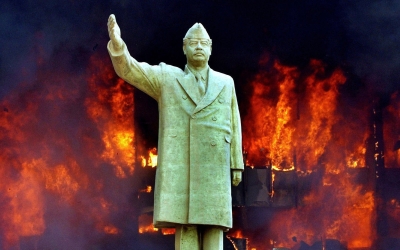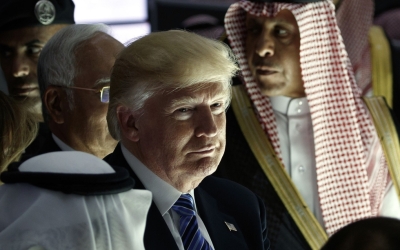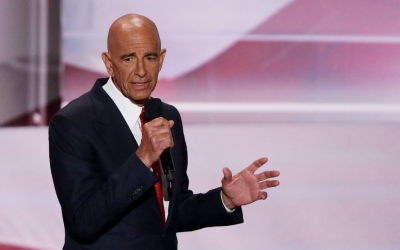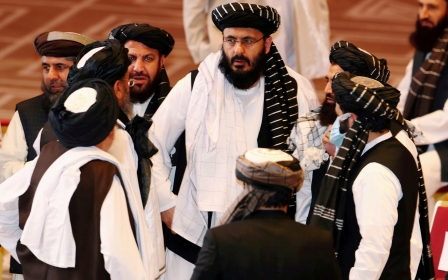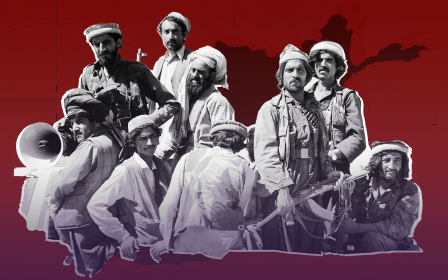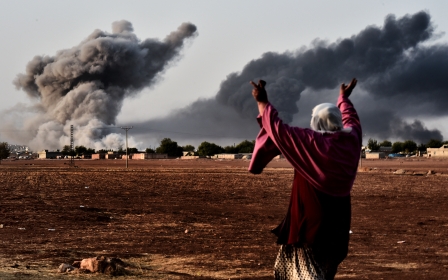How Qatar became the US-Taliban mediator - and what happens next
In the autumn of 2010, nine years into the US-led war in Afghanistan, the Taliban’s second-in-command sat across a table from Afghan and Nato officials in the city of Kandahar.
At earlier meetings, including one with then-president Hamid Karzai in his Kabul palace, Mullah Mansour had laid out surprisingly mild demands for a peace deal to reconcile the country.
Foreign forces, long the group’s greatest source of contention, could stay in Afghanistan, he told them, and the Taliban would not demand positions in the government.
The talks came at a moment when the US and allies were searching for a way out of what even then was being referred to as a forever war, and some officials were coming to realise this would require engagement with the Taliban.
Only Mullah Mansour, it turned out, wasn’t a member of the Taliban. The man who walked away with hundreds of thousands of dollars given to him by western intelligence agencies was quite probably a Pakistani shopkeeper.
It was a hugely embarrassing fiasco, “a major fuck-up”, one official told journalists. “The Americans and their allies are very stupid and anyone could fool them,” a Taliban spokesperson said.
But it is also an episode that helps illustrate how and why a tiny Gulf state with little, if any, stake in Afghanistan came to be the key interlocutor between the US and the Taliban.
Finding someone to trust
By 2010, when the fake Mullah Mansour rolled up, the US and its western allies were increasingly desperate for a line of communication with the Taliban.
A year earlier, in June 2009, US soldier Bowe Bergdahl walked off his military outpost in the eastern province of Paktika, Afghanistan. Within hours, he had been captured by the Taliban.
A sign counting his days in captivity hung inside Central Command headquarters in Florida, just past security. The pressure was on to bring the private home, but the US didn’t have a solid way of talking to his captors.
The Pakistanis couldn’t be trusted. The Saudis and the Emiratis, both willing at various points to serve as interlocutors, had supported the Taliban in the 90s so, from an American perspective, couldn’t be neutral. And then there were the impostors.
“There were these guys coming out at random and saying, ‘We represent the Taliban’. They were given large amounts of money and they just disappeared,” said Kristian Coates Ulrichsen, fellow for the Middle East at Rice University’s Baker Institute for Public Policy.
Nobody had seen Mullah Mohammed Omar, the leader of the Taliban in Afghanistan, for years, and much of the rest of the group’s leadership “had not been seen in person by American, Nato or Afghan officials,” the New York Times reported at the time of the fake Mullah Mansour.
So parking some of the Taliban’s leadership in an allied country where they had an address made sense for the US, and Qatar had already shown this could work, Ulrichsen said.
“The US had probably seen with Hamas how they’d rather have Khaled Meshaal living in Doha where they could reach him if they need to, even through intermediaries, than living in Damascus, for example,” Ulrichsen said.
'If you are a US official, you know there is someone in Doha you can talk to'
- Kristian Coates Ulrichsen, Baker Institute fellow for the Middle East
Qatar was a willing participant. Early on, according to Directorate S, journalist Steve Coll’s 2018 book which includes insider accounts of the negotiations, Sheikh Hamad bin Khalifa Al-Thani had told the Americans he would not be duped.
“They might fool you,” Qatar’s then-ruler was quoted as saying, “but with all due respect, the Taliban are not in a position to trick me.”
The Gulf state already had a history of mediating - in Lebanon, Yemen and Sudan. It was a role Qatar developed in the 90s as a way of differentiating itself regionally, partly in the hopes of becoming indispensable to powers that could be called on to help in any future crisis. It was a function that even featured in its constitution as a foreign policy objective.
But by 2013, when talks were set to begin in Doha, Qatar was also looking to reassert itself as a mediator after having drifted during the Arab Spring into a “more interventionist” role in Libya and Syria, Ulrichsen said.
The Taliban had also made it clear publicly and privately that it would only work with Qatar.
According to Coll, Tayyab Agha, representative of the group involved in conversations that eventually led to the Taliban opening a political office in Doha, told US officials the movement would not open an office “in any country that had military forces in Afghanistan, in any neighbouring country, or in any country where the presence of such an office might cause a backlash against the movement.
“Choosing Saudi Arabia, for example, would provoke a negative reaction from Iran. The governments of the United Arab Emirates and Turkey were too close to Pakistan. It had to be Qatar.”
In search of reconciliation
By 2013, more than 20 Taliban representatives and some of their family members were living in a private compound outside of Doha. From time to time, they were seen in hotels for meetings, or shopping in local malls, but mostly, say observers, they stuck to themselves.
The goal was to bring about reconciliation in Afghanistan by facilitating negotiations between the Afghan government and the Taliban.
“There are loads of ups and downs over the years where you never know where the breakthrough was, or if the breakthrough was ever going to happen,” said Andreas Krieg, a senior lecturer at King’s College London’s School of Security Studies, who observed some of the negotiations up close over the years.
One major low was the actual launch of the political office on 18 June 2013.
As State Department officials, glasses of champagne in hand, watched from Washington, according to Coll, live coverage from Al Jazeera showed Taliban representatives and a Qatari deputy foreign minister behind flower-covered podiums, in front of a large sign reading “Islamic Emirate of Afghanistan”, the formal name of Afghanistan when it was under Taliban rule.
Outside, the group’s white flag flew at full mast, later lowered to half mast behind a wall.
Afghan President Hamid Karzai - who already distrusted Qatar - had only agreed to the talks on condition that the Taliban would not use their office as a political platform, and withdrew from negotiations less than a day later.
A major high - at least from an American and Taliban perspective - was the prisoner swap which saw Bergdahl freed in March 2015 in exchange for five Taliban members held in the Guantanamo Bay prison, four of whom are now part of the Taliban’s nascent government in Kabul.
Not only was Bergdahl now free after five years in brutal captivity, the exchange was an important confidence building measure for the US, following the hijinks surrounding the opening of the political office.
“It showed that the Taliban’s office in Qatar could to some extent deliver what they promised,” Ulrichsen said. “They were trustworthy to an extent that they would deliver on what they said they would.”
The Gulf crisis
From a Qatari perspective, its role as an interlocutor and host to the Taliban, however, took on its greatest value following the June 2017 blockade of the country by regional rivals.
The UAE, Saudi Arabia, Bahrain and Egypt cut trade and diplomatic relations with Qatar and denied the country access to their airspace as punishment for what they claimed was Qatari support of militant groups and its ties to Iran, among other charges.
There was a particular panic in Qatar, said Ulrichsen, when US President Donald Trump appeared to signal to Saudi Arabia and the UAE in tweets on 6 June, a day after the blockade started, that they could do whatever they wanted.
“During my recent trip to the Middle East, I stated that there can no longer be funding of Radical Ideology. Leaders pointed to Qatar - look!” Trump tweeted.
“So good to see the Saudi Arabia visit with the King and 50 countries already paying off. They said they would take a hard line on funding extremism, and all reference was pointing to Qatar. Perhaps this will be the beginning of the end to the horror of terrorism!”
Ulrichsen said: “It was a shock because since 1990, Qatar, like all of the Gulf states, has seen the US relationship as the bedrock of its security and defence partnership, and to have that suddenly called into question was really quite a shock.”
Since then, Qatar has upped its game in Washington. In 2017, it paid $13m to US lobbying firms - triple the amount laid out the year before - and it has spent $10m or more every year since, said Ben Freeman, director of the Foreign Influence Transparency Initiative at the nonprofit Centre for International Policy.
The UAE and Saudi Arabia had already increased their lobbying spending in 2016. “Who was the winner of the blockade? K Street,” Freeman said, referring to the Washington street that houses a slew of lobbying firms.
As well as upping its spending on lobbying following the blockade, Qatar launched and paid for an expansion of al-Udeid Air Base, the largest US military facility in the Middle East, and increased cooperation on issues across the whole of the US government to ensure its relationship with the US went beyond the occupant in the White House.
“The blockade was a wake-up call,” said Dave Des Roches, a former defence department and White House official, and a professor at the National Defence University. “The blockade was a transformational event.”
Exit, Afghanistan
One card Qatar already held was its role as the US channel to the Taliban.
Nearly three years after his tweets, Trump needed the country to try to fulfil his campaign promise to end the war in Afghanistan. Last year in Doha, the US and the Taliban signed an agreement for the withdrawal of all US forces by May of this year.
The deal was a far cry from the Afghan reconciliation that had once been envisioned in Doha: the government in Kabul wasn’t at the table.
Some, like Sarah Chayes, a journalist who covered the fall of the Taliban for National Public Radio and later advised top-level US military officials working on Afghanistan, have questioned whether an agreement was even necessary.
“What was to stop us from unilaterally withdrawing - which is what we did in the end?” she wrote recently. “What was extracted from the Taliban in return for forcing the Afghan government to release thousands of enemy fighters, among other concessions, and giving the Taliban more than two years to make their case to local leaders: ‘The US is leaving. Why don’t you join us?'”
Some may question the logic - as many Afghans and Americans did at the time - of swapping Bergdahl for five key members of the Taliban in order to avoid having an American held hostage, only to have hundreds of Americans stuck in Kabul in recent weeks.
There are also those who blame Qatar for empowering the Taliban.
“It was Qatar that coordinated this debacle, from hosting a Taliban embassy to providing the framework for talks, to branding the Taliban as more ‘moderate’,” tweeted Jonathan Schanzer, senior vice president of research at the Foundation for Defense of Democracies (FDD). “This disaster was a Qatari operation.”
Public relations victory
But if the move to Doha of the US and several European Afghan embassies, and comments from US Secretary of State Antony Blinken are anything to go by, Qatar’s efforts and its continuing role as a conduit to the Taliban are a major PR coup for the country.
“Look at what Gulf countries generally spend in Washington. Tens of millions of dollars over years in lobbying fees just in an effort to get a meeting with someone,” said Krieg.
“Accommodating [the Taliban] in a compound, giving them a car and some spending money? I mean these people are not great spenders, they don’t live a lavish lifestyle. It’s the best bang for the buck you could ever think of.”
Freeman, who monitors lobbying in Washington, agreed: “Having this position is insanely valuable to them.” But Qatar, he said, is in this position “precisely because of their influence operation".
“Qatar was caught completely flat-footed in the US [during the blockade], but then Qatar ramps up this major lobbying operation of their own and it’s back in the good graces of Trump...To me, you can’t separate the two."
Beyond headlines, the goodwill fostered by Qatar’s role in Afghanistan will mean that the door to lucrative western investments - and potentially in Afghanistan - stays wide open for the country which, in London alone, owns more property than the Queen.
Perhaps most critically, there is also a sense that Qatar would be more secure in any future crisis because it now has rainy day credit of sorts with major powers.
Krieg added: “If there was another crisis - if Saudi and the UAE would decide not just to blockade Qatar but potentially generate a military operation... the Americans would definitely this time around stick up or counter, even more broadly, than they did in 2017.”
But with the rewards comes continuing risk. If the Taliban reimposes its brutal rule, Qatar's association with the group could be extremely damaging - and would embolden those who already argue that the state empowers terrorists.
While the al-Udeid Air Base is permanent and can’t be moved, the Centcom command centre now based in Qatar could be moved overnight, for example. Centcom's general is already based in Florida.
“Already we seem to have a new Taliban government that doesn’t seem particularly inclusive or representative of anyone other than themselves,” said Ulrichsen.
“If things go back to an incredibly repressive kind of regime, any association could go bad. It is a risk and we won’t know whether it pays off until a year or two down the line.”
Middle East Eye propose une couverture et une analyse indépendantes et incomparables du Moyen-Orient, de l’Afrique du Nord et d’autres régions du monde. Pour en savoir plus sur la reprise de ce contenu et les frais qui s’appliquent, veuillez remplir ce formulaire [en anglais]. Pour en savoir plus sur MEE, cliquez ici [en anglais].


